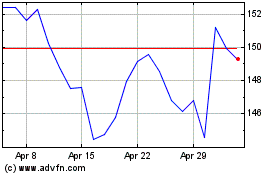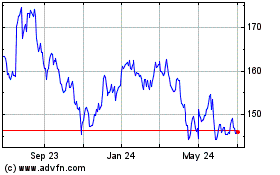Johnson & Johnson Stock Rises, Other Drug Shares Drop -- WSJ
August 28 2019 - 3:02AM
Dow Jones News
By Jared S. Hopkins
This article is being republished as part of our daily
reproduction of WSJ.com articles that also appeared in the U.S.
print edition of The Wall Street Journal (August 28, 2019).
Johnson & Johnson shares rallied Tuesday after a judge's
order that the company pay for Oklahoma's opioid crisis allayed
investors' worst fears.
While the $572 million ordered Monday by Oklahoma state court
judge Thad Balkman marked the first time a court held the drug
industry responsible for widespread opioid abuse, the amount is
limited to just one year. Judge Balkman wrote in his opinion that
the state didn't present "sufficient evidence" that justified
additional time and resources.
The amount, to pay for addiction-abatement programs, was below
expectations of more than $1 billion and significantly less than
what the state requested, analysts covering the company said in
interviews and written commentary. Several expect $572 million to
be reduced after the company appeals the decision. The analysts
said J&J's overall outlook remains promising, even with other
opioid lawsuits unresolved.
Shares of J&J closed up 1.4% at $129.64 on Tuesday.
Larry Biegelsen, an analyst at Wells Fargo & Co., wrote in a
note to clients after speaking with Johnson & Johnson
management that the verdict is a "net positive" for the New
Brunswick, N.J., company, because of how much less it was when
compared with the $17.5 billion requested by the Oklahoma attorney
general. Analysts at Raymond James Equity Research said they were
disappointed with Judge Balkman's decision, adding that if J&J
were skilled at convincing physicians to prescribe their drug, then
its market share would be higher than 1%. Both analysts rate the
company "outperform."
The amount represents a sliver of business for J&J, the
world's largest health-care company, known for households goods
like baby powder and Band-Aids. Last year's company revenue totaled
$81.6 billion.
J&J said in a statement that it disagreed with the decision
and promised an appeal, a process that could last years.
Analysts also cautioned against reading too much into how the
decision might impact the more than 2,000 lawsuits that have been
consolidated in federal court in Ohio and constitute the bulk of
legal pressure against the industry. Analysts at Morgan Stanley
said the verdict is "not definitively precedent-setting" and can't
be used to imply the outcomes of lawsuits brought by other states
or cities.
Other companies facing lawsuits nevertheless received a cold
reaction Tuesday from investors. Teva Pharmaceutical Industries
Ltd. closed down 9.6%, Endo International PLC fell about 13% and
Mallinckrodt PLC shares fell about 16%.
Teva previously agreed to an $85 million settlement with
Oklahoma. OxyContin-maker Purdue Pharma LP and its owners, the
Sackler family, agreed to pay $270 million.
Some companies that are highly leveraged will be challenged to
resolve litigation of this scale while retaining an ability to
clean up their balance sheets, said David Amsellem, an analyst at
Piper Jaffray & Co. Teva, Endo and Mallinckrodt all have large
amounts of debt to pay down.
"The stocks are reacting to that," he said in an interview. "The
challenge for these midsize companies, is how do you get any level
of confidence that they can start to chip away at their debt levels
for the foreseeable future?"
A Mallinckrodt spokesman declined to comment. Representatives
for Endo and Teva didn't respond to requests for comment.
Endo recently said it agreed to pay $10 million to avoid an
upcoming October trial in Ohio against two counties that is serving
as a bellwether for the hundreds of others brought by cities and
counties that have been consolidated in federal court. Allergan PLC
is also in negotiations for a potential $5 million deal that would
settle claims over its branded drugs but might not completely
eliminate it from the trial, The Wall Street Journal has reported.
Other companies are still slated to go to trial.
An Allergan spokeswoman said the company "hasn't yet reached a
settlement."
Mallinckrodt is one of the country's largest makers of generic
prescription opioids but it also makes raw materials for products
that it sells to other companies, a type of business that J&J
was found liable for in the Oklahoma case. Johnson & Johnson
exited the opioid-ingredients business in 2016.
Mallinckrodt, which is domiciled in Ireland but operates in the
U.S. from St. Louis, also lost a patent dispute Tuesday related to
INOmax, its nitric oxide gas product.
(END) Dow Jones Newswires
August 28, 2019 02:47 ET (06:47 GMT)
Copyright (c) 2019 Dow Jones & Company, Inc.
Johnson and Johnson (NYSE:JNJ)
Historical Stock Chart
From Mar 2024 to Apr 2024

Johnson and Johnson (NYSE:JNJ)
Historical Stock Chart
From Apr 2023 to Apr 2024
